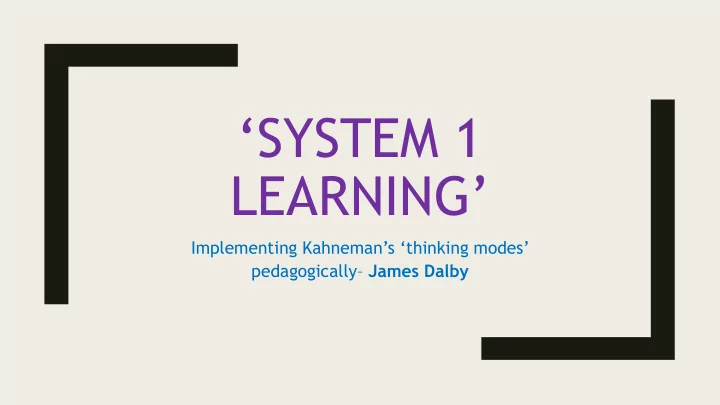

‘SYSTEM 1 LEARNING’ Implementing Kahneman’s ‘thinking modes’ pedagogically – James Dalby
QAA/SEEC Benchmarks • Level 6 - ‘Ability to work with minimal supervision in unpredictable and unfamiliar contexts, and to take responsibility for outcomes’
Modes of Thinking • System 1 • System 2 • Intuitive • Deliberate
Modes of Thinking System 1 • • System 2 Intuitive • • Deliberate ‘Cognitive Ease’ • • Cognitive Effort/Strain Creative • • Problem-solving Abstractive • • Fewer errors Superficial • • Less creative Can be ‘fooled’ • • Can be ‘lazy’
Cognitive Load – Ego Depletion • Concentration usually requires effort • Hard to sustain (unless in ‘Flow’ – Csikszentmihalyi) • Self control leads – ultimately – to Ego Depletion • Exacerbated by concerns (progress, lack of understanding, making mistakes, keeping-up with class) • Less intuitive; harder to assimilate new information to existing
‘The Associative Machine’
Associative Activation & Coherence
Gamifying – ‘Preparing the ground…’ • Preferencing System 1 approaches at the top of the session
Preparing the ground… • Preferencing System 1 approaches at the top of the session
Preparing the ground… • Preferencing System 1 approaches at the top of the session • Making objects with blu-tac! • ‘Walking lectures’ • Post-It note activities • Gamestorming • Group-solve puzzles
Remote Association Tests (Mednick) • Cottage – Swiss – Cake = Cheese • Dive – Light – Rocket = Sky • Cream – Skate – Water • Aid – Rubber – Wagon • Post-structural – Object – Simulation • Flake – Mobile - Cone
Free Association
Substitution • Faced with a complex question, we may substitute it for one easier to answer without realising
PBL & ‘Threshold Experiences’ • Problem-based learning • Experiential variants of ‘threshold concepts’ • Ideomotor effect – actions influenced by ideas • ‘Blurred - edge’ modules & assessments
Recommend
More recommend